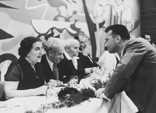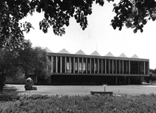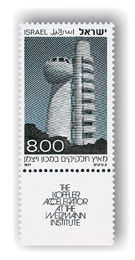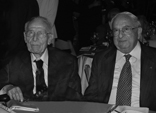Are you a journalist? Please sign up here for our press releases
Subscribe to our monthly newsletter:
Albert Einstein was against the establishment of the Daniel Sieff Research Institute. On July 26, 1934, he wrote a letter to this effect (in German) to Chaim Weizmann:
Dear Mr. Weizmann!
I thank you warmly for the detailed outline of your plan; I am glad to learn that you are devoting serious effort to the problem of accommodating our colleagues who were driven out of Germany. But I am sorry to have to write that I absolutely do not approve of your plan. You know that I think establishing an independent institute in Rehovot is a mistake. Creating even more independent institutes seems all the more questionable to me. Moreover, I think that only such people should be brought to Palestine whose professions would benefit the land.
With kind regards,
A. Einstein
Not long after, on November 21, 1934, Chaim Weizmann wrote to Israel Sieff from the newly established Daniel Sieff Research Institute:
My dear Israel,
Here the work is going on fairly well. I am urging the workers not to accept anything and not to work for any particular or special discovery as this would injure the whole character of the Institute and its scientific aspect. Practical results can only come about as a consequence of systematic scientific inquiry.
I remain, affectionately yours,
C. Weizmann
Source: Weizmann Archives
“The Chemist in the Building of the Land of Israel,” by Dr. J. Hirshberg of the Daniel Sieff Research Institute, Rehovot (translated from Hebrew)
(Extract from an article published before the Third Congress of the Palestinian Chemical Society in December, 1937)
Here in the Land of Israel, the great role of the chemist in the development of the economy has not yet been made clear to the public at large or even to the relevant institutions and associations. The congress of chemists will have to raise the question of the establishment of bold and systematic relations between chemists and people engaged in the economy and in settlement organizations.
“Memorandum Concerning the Activity of the Weizmann Institute of Science in Rehovoth, Israel, Which Represents a Significant Contribution to Agriculture, Industry and Public Life in Israel,” submitted to the Ford Foundation by H. F. Mark, Director of the Institute of Polymer Research at the Polytechnic Institute of Brooklyn, New York, March 26, 1952
It is my belief that the foregoing program, actual and potential, of the Weizmann Institute, represents a fundamental contribution to the advance and stabilization of conditions in the entire region of which Israel is the geographic center. The objectives originally set by Dr. Weizmann and his associates, and since pursued with great consistency under difficult conditions, represent, in my opinion, a sound fusion of pure and applied science; its application to the specific natural conditions and human problems of the locality holds out promise of achievement of a high order once the handicap of insufficient means is removed.
“Nuclear Parley Opens; B-G Calls for Harmony” (The conference was attended by some 200 delegates from 19 countries)
The Jerusalem Post, September 9, 1957
Prime Minister Ben-Gurion yesterday told an international gathering of scientists in Rehovot that the world needed harmonious cooperation between the students of nature and the rulers of nations. Addressing the opening session of the International Conference on Nuclear Structure at the Weizmann Institute, he said he asked himself whether the time had not come for fulfilling the Greek ideal of government by philosophers. Unfortunately, said Mr. Ben-Gurion, it was not only men of science who might ultimately decide the use to be made of the tremendous energy discovered in the last few decades but also “those individuals of suspicious and perhaps dangerous character known as politicians.”

“Weizmann Library and Archives” (translated from Hebrew)
Lamerhav, December 26, 1957
What are they building here, a cinema? That’s what people coming from Tel Aviv to Rehovot ask when they pass by the Weizmann Institute of Science – the passersby see a wide, gray concrete building with a strange “pyramid roof.” When curiosity draws them nearer, they can read a large sign announcing that the scientific institute’s library is being built here, and it will also house the Weizmann Archives.

“Prof. Rabi: Israeli Science Is on a Par with World Science,” by our correspondent in the south (translated from Hebrew)
Davar, April 25, 1957
Prof. I. I. Rabi, one of the greatest U.S. physicists and a pioneer of research on the magnetic properties of atomic nuclei, yesterday afternoon delivered the Dr. Chaim Weizmann memorial lecture at the Weizmann Institute of Science. Prof. Rabi stressed that science in Israel is conducted at a serious level, on a par with scientific institutions in the United States and Europe.
“Prof. Niels Bohr on Advanced Science, Israel and Its Personalities” (translated from Hebrew)
Davar, November 29, 1962
The acclaimed Danish physicist, who died the day before yesterday in Copenhagen, visited Israel twice as a guest and honorary fellow of the Weizmann Institute of Science in Rehovot. We present here Niels Bohr’s conversation with our correspondent Nahum Pundak during his second visit to Israel in the summer of 1958: “You have a brilliant group of young people at the Weizmann Institute of Science. This work brings honor to your name throughout the entire scientific world. You’ve already reached the stage of development at which you can give and not only take.”
“Israel Has Harnessed the White Elephant: The Weizmann Institute, until now considered purely ‘academic,’ has been recognized as ‘a certified exporter,’” by Avraham Peleg (translated from Hebrew)
Ma’ariv, March 8, 1962
One of the “attractions” presented to the delegation of the European Common Market that recently toured Israel was a nearly unknown institution called Yeda. However, this institution supplies 95 percent of the world’s consumption of heavy water, and it has registered 30 patents.
Today: Heavy isotopes of oxygen separated by this method, developed by Prof. Israel Dostrovsky of the Weizmann Institute of Science, are now produced in Israel and in various countries and used in hospital PET scan systems.
Tracing Life on Moon with Israeli Method”
The Jerusalem Post, August 14, 1967
A new research technique developed in the Chemistry Department of the Weizmann Institute of Science by Dr. Emanuel Gil-Av and his colleagues, Dr. Benjamin Feibush and Mrs. Rosita Charles-Sigler, will be used to help determine whether there is, or was, life on the moon and in outer space.
“Stamps – Particle Accelerator at the Weizmann Institute,” by Haim Galon (translated from Hebrew)
Ha’aretz, September 23, 1977
In October this year, the Ministry of Communications will issue several series of new stamps. The last stamp is dedicated to the Koffler particle accelerator at the Weizmann Institute of Science in Rehovot. The stamp was created by the veteran painter Zvi Narkis. It has been printed with a worth of 8 Israeli pounds – one of the highest values for an Israeli stamp.

"Ephraim Katzir at 70,” by Walter A. Rosenblith
Rehovoth Magazine, 1986/1987
(v. 10, no. 2)
A number of major events took place, both off and on campus, this year in honor of Prof. Ephraim Katzir’s 70th birthday, the most impressive of which, perhaps, was the five-day Symposium on Biophysics and Biotechnology. It opened at the Weizmann Institute last spring in the presence of Israel’s President Chaim Herzog.

Today: Several months ago, Prof. Katzir celebrated his 90th birthday. An international scientific conference was held at the Weizmann Institute to mark the occasion.
Prof. Dostrovsky is the incumbent of the Agnes Spencer Professorial Chair
of Physical Chemistry.
Prof. Katzir is the incumbent of the Theodore R. Racoosin Professorial Chair of Biophysics.